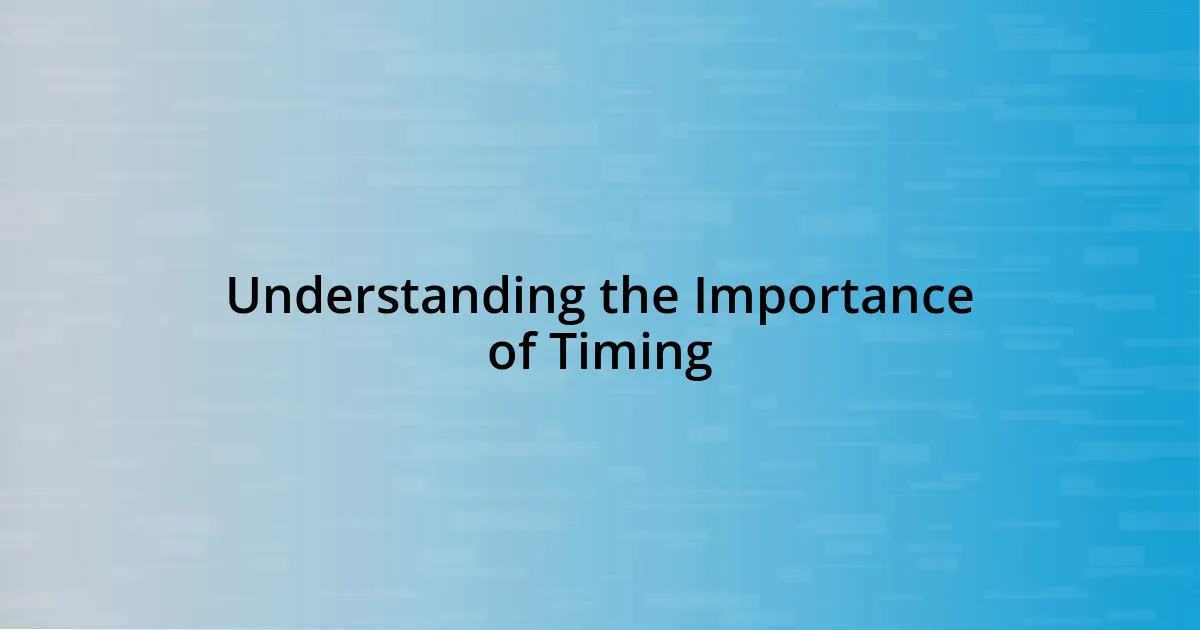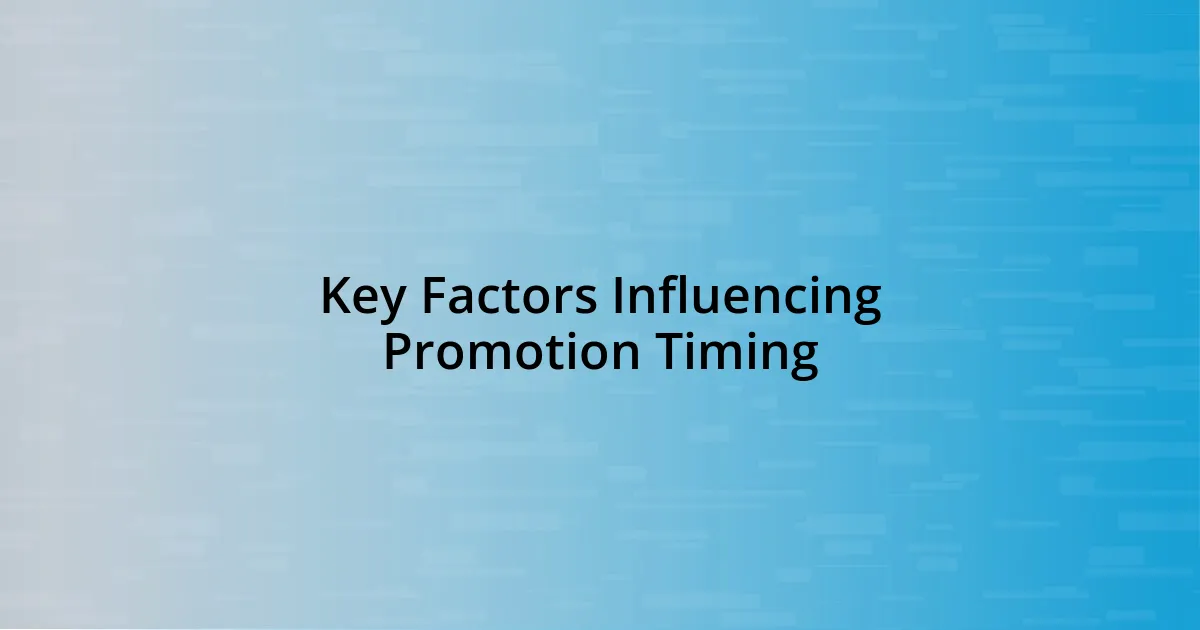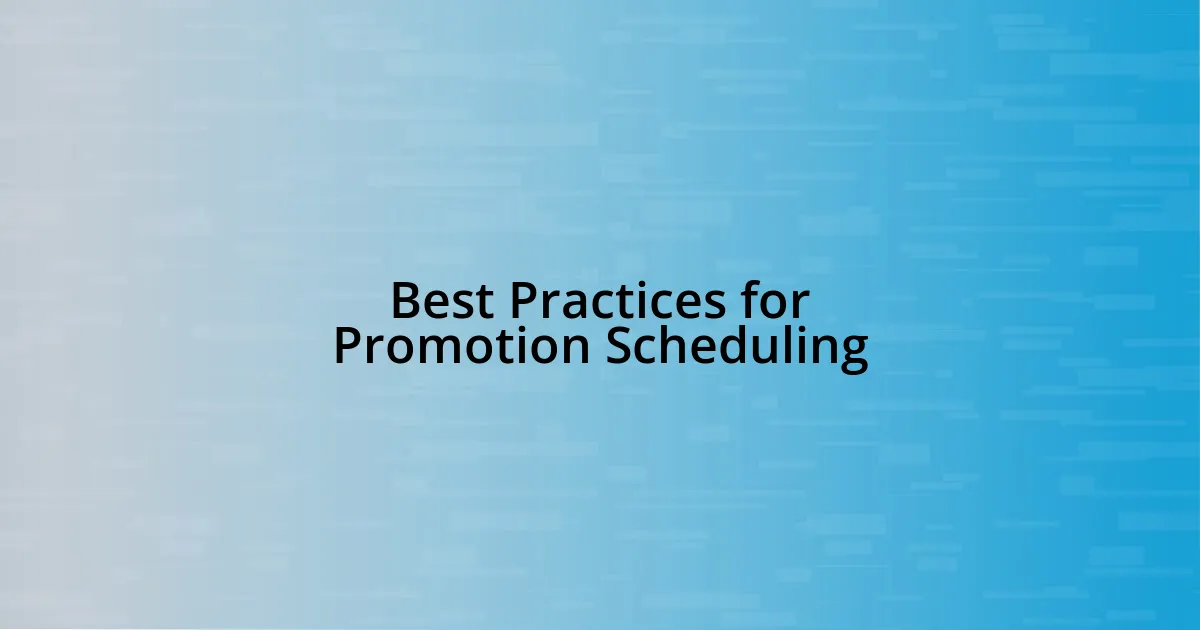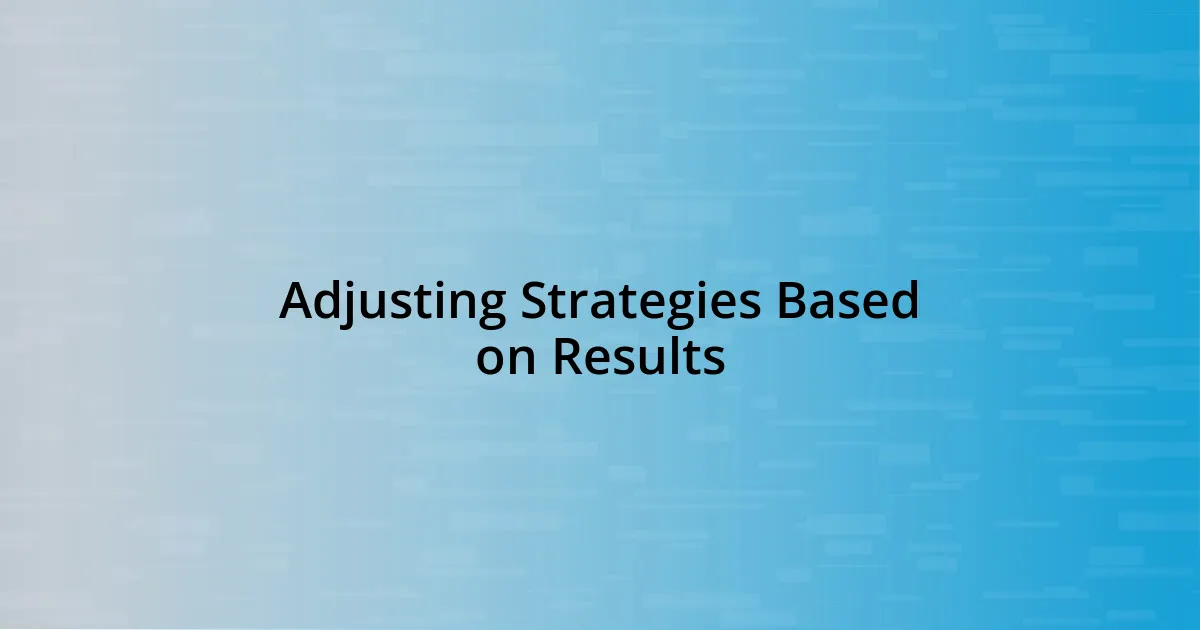Key takeaways:
- Timing plays a critical role in promotion requests; aligning them with company milestones and positive organizational climates increases chances of success.
- Understanding team dynamics and external factors, such as market trends and economic conditions, helps determine the best time to seek a promotion.
- Scheduling promotions after recent successes and gauging the company’s financial health can significantly influence the outcome of the request.
- Self-reflection and monitoring team engagement post-promotion are essential for evaluating success and guiding future strategies.

Understanding the Importance of Timing
Timing can genuinely make or break your chances for a promotion. I remember a time when I was passed over for a promotion because I didn’t align my request with the company’s financial schedule. It made me realize that understanding the ebb and flow of your workplace can be just as crucial as your performance. Have you ever considered how the overall climate at your organization may affect your promotion prospects?
Sometimes, it’s about the subtle shifts in organizational priorities. I once witnessed a colleague who strategically timed her promotion pitch right after a successful project launch. The timing of her request coincided with a heightened appreciation for her contributions, which certainly strengthened her case. This taught me a powerful lesson: being aware of significant company milestones can enhance your visibility and make your efforts more recognized.
Furthermore, the importance of timing isn’t just statistical; it’s emotional. When you approach a promotion conversation during a tense period, like layoffs or budget cuts, it might feel more like an uphill battle. Reflecting on how decisions are made in those moments can help you choose a better time. What would you rather do, boldly pitch your aspirations when everyone’s optimistic or when morale is low? Understanding this emotional landscape can deepen your insight into when to step forward.

Key Factors Influencing Promotion Timing
Timing is a crucial aspect that I’ve learned to navigate wisely in my career. I’ve seen firsthand how aligning a promotion request with performance reviews can create a more favorable outcome. For example, during my last review cycle, I skillfully highlighted my achievements from the past year. This not only provided the management with a concrete basis for consideration but also increased my chances, as the focus was already on assessing contributions at that moment. Have you noticed how such rhythms in organizations can directly impact your standing?
Another factor I often consider is the team dynamics within the workplace. I remember a time when I hesitated to ask for a promotion because my team was going through significant changes. It felt like the wrong moment when several members were adjusting to new roles. Once the dust settled and we found our stride again, I realized how important it was to gauge the emotional climate of my peers. Trust me, understanding how your request will fit within the broader team context can provide clarity and confidence when you choose to step forward.
Moreover, external factors can also play a significant role in timing your promotion discussions. During a particularly busy season in my company, I decided to hold off my promotion talk. The leadership team was bogged down with deadlines, and I didn’t want to add to their stress. Waiting for a quieter period allowed me to approach them when they were more receptive. This taught me that not only organizational but also industry-wide circumstances can influence the best time to seek a promotion. What external indicators do you watch for when deciding your moment to shine?
| Key Factor | Description |
|---|---|
| Organizational Cycle | Aligning requests with performance reviews or annual planning. |
| Team Dynamics | Understanding the emotional state and stability of your team can affect timing. |
| External Circumstances | Being aware of broader industry trends and company pressures that may impact decision-making. |

Analyzing Market Trends for Promotions
It’s fascinating how market trends can shape the timing of promotions. I vividly remember when our industry shifted towards digital innovation. This transformation created a surge in demand for employees skilled in tech. I chose to showcase my new digital skills at this pivotal moment, which directly influenced my promotion. It was a bold move that paid off, emphasizing how aligning personal strengths with market needs can alter timing effectively.
Reflecting on these shifts, I find it essential to analyze both internal and external factors. Here’s what to keep in mind:
- Market Demand: Identify key trends in your industry. If your organization is moving in a new direction, align your strengths to meet those needs.
- Competitor Activity: Pay attention to what competitors are doing. If they are promoting talent in specific areas, consider how you can fill similar gaps.
- Economic Conditions: Economic highs and lows often impact hiring practices. Strive to make your case when companies are gaining confidence and investing in growth.
By tuning into these signals, you position yourself strategically for approaching the topic of promotions.

Best Practices for Promotion Scheduling
Timing for promotions is an art that deserves careful consideration. One practice I found effective is to schedule discussions when you can reference your recent successes. For instance, after leading a successful project that boosted our team’s metrics, I felt compelled to approach my manager. It transformed a routine conversation into a significant dialogue about my growth. Have you ever noticed how capitalizing on a recent win can shift the energy around promotion talks?
Moreover, I can’t stress enough the importance of being attuned to your company’s financial health. I remember a time when our organization announced budget cuts. It would have been a rookie mistake to push for a promotion during those discussions. Instead, I chose to support my team during that tough period and waited for the company to find its footing again. Have you ever considered how timing can reflect not just your ambitions but also your awareness of broader organizational realities?
Lastly, don’t underestimate the power of informal conversations before making a formal request. I learned this lesson from a casual chat with my mentor, who advised me to “test the waters” first. After gauging the management’s sentiments and listening to their priorities, I refined my approach. It made all the difference; I went into the meeting feeling equipped and confident. When was the last time you strategized your promotion request with preliminary insights?

Evaluating the Success of Promotions
Evaluating the success of promotions often hinges on measurable outcomes and personal reflections. I recall a time when I received a promotion that came with significant responsibility. Initially, I thought success would be defined solely by my increased pay and title, but soon realized it was about how well I could lead my team and contribute to our collective goals. Have you ever evaluated your success based on the impact you had rather than just the title you wore?
One crucial metric I find valuable is employee engagement levels. After my promotion, I made it a point to regularly check in with my team, seeking feedback on how they felt about our projects and goals. This not only fostered a positive atmosphere but also gave me insight into how my leadership style influenced our performance. I’ve learned that when your team thrives, it’s often a reflection of good promotion timing and strong leadership. Could tracking team morale during such transitions be the missing link in your promotional evaluation?
Lastly, I can’t overlook how important self-reflection is after achieving a promotion. It’s a moment to ask yourself critical questions: Did I rise to the occasion? Was I able to navigate the challenges effectively? Personally, I embraced journaling about my experiences and how I felt during key moments. This practice helped me identify patterns in my growth and areas for improvement. How do you measure your success in the roles you take on? It’s worth thinking deeply about.

Adjusting Strategies Based on Results
Adjusting strategies based on results is a dynamic process that requires keen observation and flexibility. I remember a time when I led a project that fell short of our anticipated outcomes. Instead of pushing for a quick promotion, I chose to evaluate what went wrong and leveraged that experience for growth. Have you ever taken a step back to reassess your strategy after a setback? For me, it was a turning point that allowed me to present a more compelling case for my capabilities later on.
As I’ve navigated my career, I’ve learned that being responsive to feedback is crucial. After receiving constructive criticism following a performance review, I adjusted my approach. This flexibility not only improved my work but also demonstrated my commitment to growth. I’ve found that showing a willingness to adapt can open doors for further discussions about advancement. Have you considered how your ability to pivot based on feedback might influence your own promotion journey?
Finally, monitoring both personal growth and team performance can provide valuable insights. I once facilitated a team workshop aimed at improving collaboration, and I tracked our progress closely. When I saw enhanced cooperation and increased productivity, it became clear that my focus on team dynamics was paving the way for my personal recognition within the organization. Isn’t it fascinating how your success is often intertwined with the growth of those around you? That realization has guided my promotion discussions ever since.















